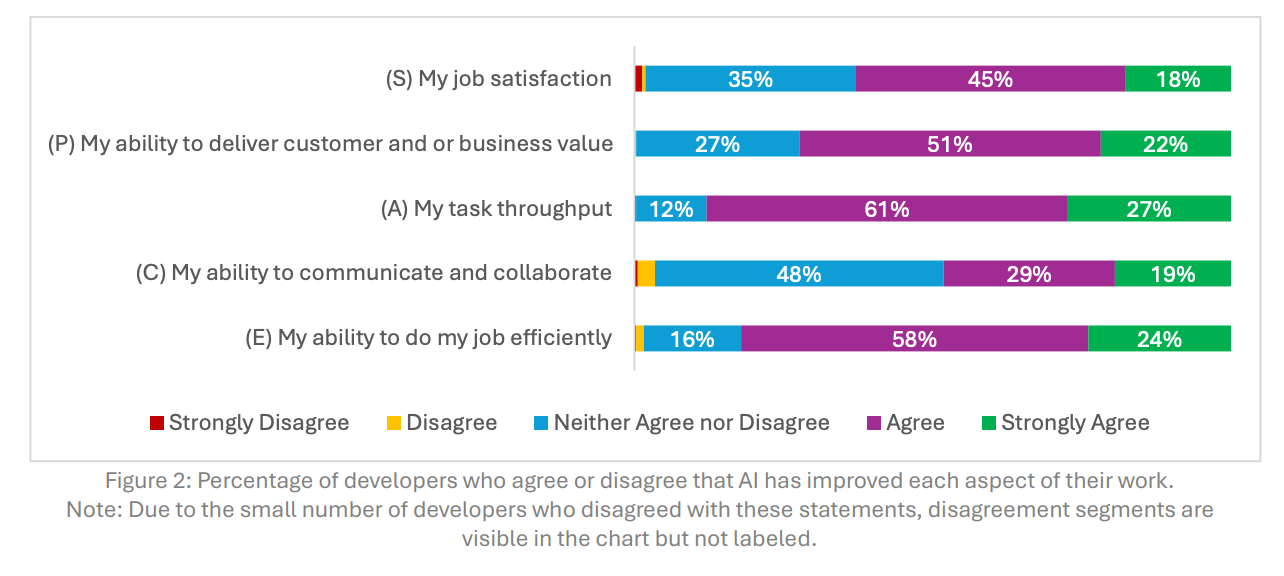RDEL #104: How does the SPACE framework apply to AI's impact on engineering?
Developers report higher speed, efficiency, and satisfaction with AI—yet less than half see improvements in collaboration.
Welcome back to Research-Driven Engineering Leadership. Each week, we pose an interesting topic in engineering leadership, and apply the latest research in the field to drive to an answer.
As AI tools become a standard part of software development, engineering leaders face a new challenge: understanding not just if AI is helping—but how. Output metrics are readily available, but create an incomplete view of how AI improves productivity. This week we ask: How is AI really impacting developer productivity across the SPACE framework?
The context
In the early days of AI-assisted development, most conversations focused on speed. Did GitHub Copilot cut coding time in half? Could LLMs write boilerplate code faster than a junior engineer? But engineering leaders have long known that measuring productivity by activity alone—like lines of code or number of commits—misses the mark. That’s why frameworks like SPACE exist: to account for the many dimensions that shape developer effectiveness, from satisfaction and collaboration to efficiency and value delivered.
What’s been missing in the discussion of AI’s impact in engineering is a structured look at how AI changes the broader developer experience—how it affects team dynamics, satisfaction, perceived value, and the nature of the work itself. As AI tools shift from experiment to expectation, leaders need a better lens for understanding what’s truly changing, and how to ensure those changes are for the better.
The research
To assess AI’s real-world impact on software developers, researchers conducted a mixed-methods study, combining a survey of 530 developers (from Microsoft and 15+ other companies) with qualitative interviews and observations. Most participants were individual contributors in the U.S., with representation from companies like Airbnb, Atlassian, Meta, Reddit, and Netflix. In addition to the survey, the team ran in-depth interviews with 30 developers and managers, and observational studies with 23 professional Java developers using GitHub Copilot.
Key findings:
75% of developers reported regular AI use, and 64% used AI at least once per week.
88% of regular AI users said it improves task throughput, and 82% said it improves efficiency.
71% said AI helps them deliver customer or business value, and 62% reported higher job satisfaction.
Only 48% agreed AI improved collaboration, and many remained neutral.
Interestingly, interviews revealed AI reduced low-value interruptions and enabled higher-quality conversations, even if that wasn’t captured in survey metrics.
Developers in AI-supportive teams were 7x more likely to use AI daily—and more likely to perceive both personal and team-wide productivity gains.
“Developers on teams with higher AI adoption don’t just rate their team as more productive—they also report stronger personal agreement that AI makes themselves more productive.”
The application
This study reinforces what many leaders are starting to see firsthand: AI doesn’t just affect how developers work—it changes the experience of work itself. From reducing tedious tasks to reshaping team interactions, the impact goes far beyond speed. But these benefits don’t happen automatically. They depend on team norms, trust, and shared learning.
Here’s how engineering leaders can apply this research:
Treat AI adoption as a team habit. When adoption is uneven, developers miss out on peer learning—and collaboration patterns become fragmented. Build shared norms around when and how to use AI, and encourage open discussion about its limitations.
Shift coaching conversations from “Are you using AI?” to “Where is AI helping—and where isn’t it?” This opens the door to practical support, rather than performance pressure.
Measure across SPACE, not just speed. If you want to understand the impact of AI, track changes in satisfaction, collaboration, and delivery—not just output volume.
The next frontier of AI adoption isn’t technical—it’s cultural. Teams that create space for experimentation, reflection, and shared learning will be the ones that capture real, lasting gains.
—
Happy Research Tuesday,
Lizzie

